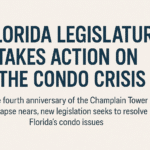How Third-Party Litigation Funding is Making Your Job Harder as an Insurance Adjuster
At Turning the Corner: The New Normal of the Florida Insurance Marketplace, we heard Wesley Todd of Case Glide discuss a growing issue that’s making life more difficult for adjusters like us: third-party litigation funding (TPLF).
If you’ve been in the insurance industry long enough, you’ve probably seen a claim that should have been settled quickly drag out for months—or even years—because a lawyer got involved. But what if I told you that in many cases, it’s not even the plaintiff or their attorney calling the shots?
Enter third-party litigation funding—a multi-billion-dollar industry where outside investors bankroll lawsuits, dictate legal strategies, and drive up claims costs, all in the name of profit.
Why Adjusters Should Care About Litigation Funding
We’ve all been there—a claim that could have been handled amicably turns into a legal nightmare. Instead of negotiating directly with a policyholder or their attorney, you’re suddenly dealing with a lawsuit that seems designed to stretch out as long as possible.
Here’s why:
- Funders control settlements – Many TPLF contracts prohibit plaintiffs from settling early, meaning even when we present a fair and reasonable offer, it gets rejected—not because the plaintiff wants to fight, but because the investor needs to maximize their return.
- They drive up defense costs – More cases go to trial instead of settling, leading to higher legal expenses for insurers, which ultimately impacts policyholders through higher premiums.
- They create an unfair playing field – Unlike insurers, who must follow strict regulations, these litigation funders operate in the shadows with zero oversight.
How Litigation Funders Exploit Policyholders
These companies market themselves as champions of the little guy, claiming they help plaintiffs afford legal representation and living expenses while awaiting a settlement. And while that may be true in some cases, here’s what they don’t tell their clients:
- They take a massive cut of any payout. Many plaintiffs walk away with a fraction of their awarded damages because the funder pockets the majority.
- They don’t have the plaintiff’s best interest in mind. Litigation funders aren’t charities—they’re investment firms looking for a high return on their money. If it’s more profitable to reject a fair settlement and drag a case out, that’s exactly what they’ll do.
- They manipulate claims to fit their profit model. Many times, they’ll push for exaggerated claims and prolonged legal battles, making it harder for adjusters to fairly evaluate damages and close claims efficiently.
What This Means for Insurance Adjusters
As adjusters, we’re already juggling complex claims, policyholder expectations, and regulatory requirements. The last thing we need is a shadow industry artificially inflating claims, increasing litigation, and eroding trust in the process.
Instead of working with policyholders to reach a fair outcome, we’re now facing a system where lawsuits are a financial strategy for investors, not about righting a wrong.
And this isn’t just a Florida issue—it’s a nationwide and even global problem. The litigation funding industry is worth over $15 billion in the U.S. and is largely unregulated.
The National Security Concern: Foreign Money in U.S. Lawsuits
To make matters worse, because there’s no transparency in litigation funding, we don’t even know who’s behind many of these lawsuits.
- Russian billionaires have used litigation funding to manipulate lawsuits in the U.S. and U.K. (Bloomberg investigation).
- Chinese-backed firms have secretly funded intellectual property cases in U.S. courts (Delaware disclosures exposed PurpleVine IP’s involvement).
- In most states, there’s no way to know who is funding a lawsuit—which means foreign adversaries could be using our legal system against us.
Is There a Solution?
Some states are starting to take action, but Florida and Texas have yet to introduce meaningful legislation to regulate litigation funding. The good news? At the federal level, House Resolution 9922—the Litigation Transparency Act—was introduced in October 2024 and is currently under review by the House Committee on the Judiciary.
If passed, this bill would require disclosure of litigation funders, bringing much-needed transparency to this hidden industry.
Final Thoughts: A Call to Action for Insurance Professionals
The bottom line? Third-party litigation funding is making our jobs harder.
- It’s inflating claims, forcing more cases to trial, and delaying settlements that should be resolved quickly.
- It’s driving up legal costs, which increases insurance premiums for everyone.
- It’s introducing foreign influence into U.S. litigation, putting national security at risk.
As adjusters, we see firsthand how this impacts the industry, and it’s time to push for transparency and reform. The more awareness we bring to this issue, the better chance we have at curbing abusive litigation funding practices and restoring fairness to the claims process.




